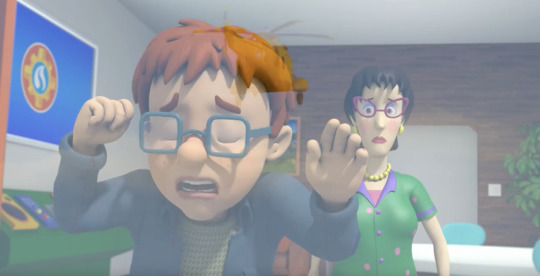#dilys price
Text
youtube
get out stay out and call 999
2 notes
·
View notes
Text
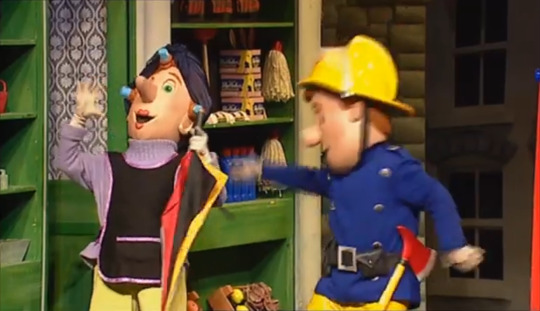
ahhhh
3 notes
·
View notes
Photo
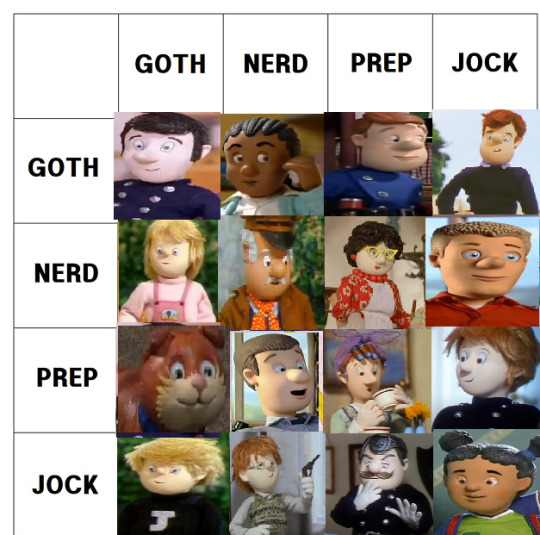
Listen I know this is a bit of a reach but I needed to fill some spaces (so series 5 sam was added in)
#prep goth nerd jock alignment chart#alignment chart meme#meme#edits#fireman sam series 5#fireman sam#classic fireman sam#elvis cridlington#sarah jones#james jones#rosa#helen flood#mandy flood#norman price#trevor evans#mike flood#bella lasagna#dilys price#station officer steele#tom thomas#penny morris#sam peyton jones#fireman sam classic
11 notes
·
View notes
Text
Gem Amra Kheli
Translation: Games We Play
I finally did it, you guys. A lil' drabble is what I could muster for some fluff for you guys. It's set in the same story as Young Price and Bluebird.

Pairing: John Price x f!Reader
It started as something to pass the time.
A stakeout wherein hours felt endless, like watching that drop of water dangling from a faucet unable to fall. You think if you kept your eyes turned away, it might surprise you — but lo and behold, it’s still fucking there.
It makes you fidget. The waiting around for something, anything, to happen. It’s a weird kind of limbo to be stuck in. You’re on edge, as you often are, consciously aware and on the look for seemingly nothing. A harrowing trap in the betwixt and between tension and routine.
The consistent reverberation of the air conditioning that might as well have been a prop. The spice laden bouquet wafting upwards from the chaiwala on the pavement around the corner with his recurrent chorus of ‘Kichu chā chai?’ to everyone who passed by.
“Just try it.” He insisted.
You made a face at the terracotta cup he held between his thumb and forefinger — it probably held a little shy of three sips worth inside.
“There’s a kettle in the corner if I want tea, John. You didn’t have to—”
“Try it.”
That was a week ago, and your kettle remained untouched.
“Blue.” He began, his hand firmly planted on the back of yours— you were unknowingly peeling off the edges of your nicotine patch.
“Hmm?” You shook it off, smoothing over the frayed edges of the acetate film.
Another day of nothing and no one. Not counting the ensemble of transient strangers at your feet, just going about their day. Too random to find a pattern in, not haphazard enough to find any interest in surveying.
You watched the sun descend from its perpendicular position to half-mast, pulling with it a polychrome of burnt sienna and honeyed marmalade. The mismatched rooftops across your horizon interrupted its gleam in blocks of tan and taupe.
You tried to count them all.
“Play a game with me.” He takes a drag of his cigar, a shameless grin etched across his face.
“Nasty little habit you started there, John.”
“Just as you quit yours, love.”
“Fuckin’ prick.”
You resist the urge to inhale, let the murky smoke invade your lungs. The scent of it is a spiritous mix of all things provocative.
You glance down at your worn out patch and it mocks you back.
You might just—
“Go on, then.”

“Timor-Leste” His voice crackles over comms, as you make your way through the streets of Leipzig.
“Dili.” You pull your little notepad out from underneath the breast strap of your vest, and a pencil run down to its last couple inches, from the lip of John’s beanie which now rests on your head. “You’ve asked me that one before, John.”
“Doesn’t count then. You better not add that one to the tally.”
“Already have.”
“Cheat.”
That summer evening in Calcutta inaugurated a tradition of you parading your geographical prowess. Whenever you grew listless, and the silence grew too comfortable, he would ask. Eventually you began to keep a running score, once yours and his intrinsic competitiveness seeped in.
So far, you’ve only lost twice.
You haven’t decided what prize the grand victor would earn. It could be anything — he said as much.
“Can’t have it be a competition without something to compete for.”
“You’ll figure something out, I’m sure. Since I’ll win.”
“Bit naive to drop the chance to ask me for anything you want, love.”
You already know what you want, but—
“Remind me never to lose to you, John. Christ.”
“Lesotho.” He starts again.
It takes you a minute before you answer, with some uncertainty. “Maseru?”
“That a question or the answer.”
“Am I right?”
He confirms eventually with a gruff affirmative.

You peruse the pages of your now-filled notepad, the edges of it curving upwards — 154 tallies for you, and 42 for him.
Amongst those are little messages swapped between you and him. A limerick, now and then, or maybe a reminder. A cartoonish sketch of him on the top right corner of a page which he’s since torn off. It now lives in the coin zipper of his wallet.
As predicted, you won.
And it was a victory rendered bittersweet by its arrival. You kept your ask simple.
“Buy me a drink.” You said.
“I’ve bought you loads.” He countered with an expectant look. “We can do better than that.”
Yes, John. We can.
“What would you have asked for? If you’d won.”
“A kiss.”
“I’ll have the same, then.”
He obliged, of course. And it was everything you had imagined and then some.
His breath still lingered with the taste of his last cigar. His lips, softer than they looked, pressed against yours in a way so chaste, you’d have thought it was his first.
And when he finally pulled away—
“Let’s see how well you do with state capitals.”

Chaiwala - Tea Vendor
Kichu chā chai? - Do you want tea?
#john price x reader#price x reader#john price x you#captain john price x you#captain john price x reader#john price#captain john price#mw2 price#mw2 x reader#mw2 fanfic#mwii#cod mwii#mw2#mw2 imagine#cod x reader#cod fanfic#cod:mw2#cod imagine#cod smut#call of duty imagine#call of duty fanfic
164 notes
·
View notes
Text
Atrocities US committed against ASIA
Between 1996-2006, The US has given money and weapons to royalist forces against the nepalese communists in the Nepalese civil war. ~18,000 people have died in the conflict. In 2002, after another civil war erupted, President George W. Bush pushed a bill through Congress authorizing $20 million in military aid to the Nepalese government.
In 1996, after receiving incredibly low approval ratings, the US helped elect Boris Yeltsin, an incompetent pro-capitalist independent, by giving him a $10 Billion dollar loan to finance a winning election. Rather than creating new enterprises, Yeltsin’s democratization led to international monopolies hijacking the former Soviet markets, arbitraging the huge difference between old domestic prices for Russian commodities and the prices prevailing on the world market. Much of the Yeltsin era was marked by widespread corruption, and as a result of persistent low oil and commodity prices during the 1990s, Russia suffered inflation, economic collapse and enormous political and social problems that affected Russia and the other former states of the USSR. Under Yeltsin, Between 1990 and 1994, life expectancy for Russian men and women fell from 64 and 74 years respectively to 58 and 71 years. The surge in mortality was “beyond the peacetime experience of industrialised countries”. While it was boom time for the new oligarchs, poverty and unemployment surged; prices were hiked dramatically; communities were devastated by deindustrialisation; and social protections were stripped away.
In the 1970s-80s, wikileaks cables revealed that the US covertly supported the Khmer Rouge in their fight against the Vietnamese communists. Annual support included an end total of ~$215M USD, food aid to 20-40k Khmer Rouge fighters, CIA advisors in several camps, and ammunition.
In December 1975, The US supplied the weaponry for the Indonesian invasion of East Timor. This incursion was launched the day after U.S. President Gerald Ford and Secretary of State Henry Kissinger had left Indonesia where they had given President Suharto permission to use American arms, which under U.S. law, could not be used for aggression. Daniel Moynihan, U.S. ambassador to the UN. said that the U.S. wanted “things to turn out as they did.” The result was an estimated 200,000 dead out of a population of 700,000. Sixteen years later, on November 12, 1991, two hundred and seventeen East Timorese protesters in Dili, many of them children, marching from a memorial service, were gunned down by Indonesian Kopassus shock troops who were headed by U.S.- trained commanders Prabowo Subianto (son in law of General Suharto) and Kiki Syahnakri. Trucks were seen dumping bodies into the sea.
In 1975 Australian Constitutional Crisis, the CIA helped topple the democratically elected, left-leaning government of Prime Minister Gough Whitlam, by telling Governor-General, John Kerr, a longtime CIA collaborator, to dissolve the Whitlam government.
In 2018 after the release of a suppressed ISC (International Scientific Commission) report, and the release of declassified CIA communications daily reports in 2020, it was revealed that the US used germ warfare in the Korean war, 2. Many of these attacks involved the dropping of insects or small mammals infected with viruses such as anthrax, plague, cholera, and encephalitis. After discovering evidence of germ warfare, China invited the ISC headed by famed British scientist Joseph Needham, to investigate, but the report was suppressed for over 70 years.
Between 1963 and 1973, The US dropped ~388,000 tons of napalm bombs in vietnam, compared to 32,357 tons used over three years in the Korean War, and 16,500 tons dropped on Japan in 1945. US also sprayed over 5 million acres with herbicide, in Operation Ranch Hand, in a 10 year campaign to deprive the vietnamese of food and vegetation cover.
In 1971 in Pakistan, an authoritarian state supported by the U.S., brutally invaded East Pakistan in the Indo-Pakistani war of 1971. The war ended after India, whose economy was staggering after admitting about 10 million refugees, invaded East Pakistan (now Bangladesh) and defeated the West Pakistani forces. The US gave W. pakistan 411 million provided to establish its armed forces which spent 80% of its budget on its military. 15 million in arms flowed into W. Pakistan during the war. Between 300,000 to 3 million civilians were killed, with 8-10 million refugees fleeing to India.
In 1970, In Cambodia, The CIA overthrows Prince Sihanouk, who is highly popular among Cambodians for keeping them out of the Vietnam War. He is replaced by CIA puppet Lon Nol, whose forces suppressed the large-scale popular demonstrations in favour of Sihanouk, resulting in several hundred deaths. This unpopular move strengthens once minor opposition parties like the Khmer Rouge (another CIA supported group), who achieve power in 1975 and massacres ~2.5 million people. The Khmer Rouge, under Pol Pot, carried out the Cambodian Genocide, which killed 1.5-2M people from 1975-1979.
In 1969, The US initiated a secret carpet bombing campaign in eastern Cambodia, called, Operation Menu, and Operation Freedom Deal in 1970. An estimated 40,000 - 150,000 civilians were killed. Nixon lied about this campaign, but was later exposed, and one of the things that lead to his impeachment.
US dropped large amounts of Agent Orange, an herbicide developed by monsanto and dow chemical for the department of defense, in vietnam. Its use, in particular the contaminant dioxin, causes multiple health problems, including cleft palate, mental disabilities, hernias, still births, poisoned breast milk, and extra fingers and toes, as well as destroying local species of plants and animals. The Red Cross of Vietnam estimates that up to 1 million people are disabled or have health problems due to Agent Orange.
US Troops killed between 347 and 504 unarmed civilians, including women, children, and infants, in South Vietnam on March, 1968, in the My Lai Massacre. Some of the women were gang-raped and their bodies mutilated. Soldiers set fire to huts, waiting for civilians to come out so they could shoot them. For 30 years, the three US servicemen who tried to halt the massacre and rescue the hiding civilians were shunned and denounced as traitors, even by congressmen.
In 1967, the CIA helped South Vietnamese agents identify and then murder alleged Viet Cong leaders operating in villages, in the Phoenix Program. By 1972, Phoenix operatives had executed between 26,000 and 41,000 suspected NLF operatives, informants and supporters.
In 1965, The CIA overthrew the democratically elected Indonesian leader Sukarno with a military coup. The CIA had been trying to eliminate Sukarno since 1957, using everything from attempted assassination to sexual intrigue, for nothing more than his declaring neutrality in the Cold War. His successor, General Suharto, aided by the CIA, massacred between 500,000 to 1 million civilians accused of being communist, in the Indonesian mass killings of 1965-66. The US continued to support Suharto throughout the 70s, supplying weapons and planes.
Between 1964 and 1973, American pilots flew 580,000 attack sorties over Laos, an average of one planeload of bombs every eight minutes for almost a decade. By the time the last US bombs fell in April 1973, a total of 2,093,100 tonnes of ordnance had rained down on this neutral country. To this day, Laos, a country of just 7 million people, retains the dubious accolade of being the most heavily bombed country in the world per capita.
From the 1960s onward, the US supported Filipino dictator Ferdinand Marcos. The US provided hundreds of millions of dollars in aid, which was crucial in buttressing Marcos’s rule over the years. The estimated number of persons that were executed and disappeared under President Fernando Marcos was over 100,000. After fleeing to hawaii, marco was suceeded by the widow of an opponent he assasinated, Corazon aquino.
Starting in 1957, in the wake of the US-backed First Indochina War, The CIA carries out approximately one coup per year trying to nullify Laos’ democratic elections, specifically targeting the Pathet Lao, a leftist group with enough popular support to be a member of any coalition government, and perpetuating the 20 year Laotian civil war. In the late 50s, the CIA even creates an “Armee Clandestine” of Asian mercenaries to attack the Pathet Lao. After the CIA’s army suffers numerous defeats, the U.S. drops more bombs on Laos than all the U.S. bombs dropped in World War II. A quarter of all Laotians will eventually become refugees, many living in caves. This was later called a “secret war,” since it occurred at the same time as the Vietnam War, but got little press. Hundreds of thousands were killed.
In 1955, the CIA provided explosives, and aided KMT agents in an assassination attempt against the Chinese Premier, Zhou Enlai. KMT agents placed a time-bomb on the Air India aircraft, Kashmir Princess, which Zhou was supposed to take on his way to the Bandung Conference, an anti-imperialist meeting of Asian and African states, but he changed his travel plans at the last minute. Henry Kissinger denied US involvement, even though remains of a US detonator were found. 16 people were killed.
From 1955-1975, the US supported French colonialist interests in Vietnam, set up a puppet regime in Saigon to serve US interests, and later took part as a belligerent against North Vietnam in the Vietnam War. U.S. involvement escalated further following the 1964 Gulf of Tonkin incident, which was later found to be staged by Lyndon Johnson. The war exacted a huge human cost in terms of fatalities (see Vietnam War casualties). Estimates of the number of Vietnamese soldiers and civilians killed vary from 966,000 source to 3.8 million.source Some 240,000–300,000 Cambodians,source23 20,000–62,000 Laotians,4 and 58,220 U.S. service members also died in the conflict, with a further 1,626 missing in action. Unexploded bomb continue to kill civilians for years afterward.
In the summer of 1950 in South Korea, anticommunists aided by the US executed at least 100,000 people suspected of supporting communism, in the Bodo League Massacre. For four decades the South Korean government concealed this massacre. Survivors were forbidden by the government from revealing it, under suspicion of being communist sympathizers. Public revelation carried with it the threat of torture and death. During the 1990s and onwards, several corpses were excavated from mass graves, resulting in public awareness of the massacre.
In 1984, documents were released showing that Eisenhower authorized the use of atomic weapons on North Korea, should the communists renew the war in 1953. The 2,000 pages released show the high level of planning and the detail of discussion on possible use of these weapons, and Mr. Eisenhower’s interest in overcoming reluctance to use them.
In the beginning of the Korean war, US Troops killed ~300 South Korean civilians in the No Gun Ri massacre, revealing a theater-wide policy of firing on approaching refugee groups. Trapped refugees began piling up bodies as barricades and tried to dig into the ground to hide. Some managed to escape the first night, while U.S. troops turned searchlights on the tunnels and continued firing, said Chung Koo-ho, whose mother died shielding him and his sister. No apology has yet been issued.
The US intervened in the 1950-53 Korean Civil War, on the side of the south Koreans, in a proxy war between the US and china for supremacy in East Asia. South Korea reported some 373,599 civilian and 137,899 military deaths, the US with 34,000 killed, and China with 114,000 killed. Overall, the U.S. dropped 635,000 tons of bombs—including 32,557 tons of napalm—on Korea, more than they did during the whole Pacific campaign of World War II. The US killed an estimated 1/3rd of the north Korean people during the war. The Joint Chiefs of staff issued orders for the retaliatory bombing of the People’s republic of China, should south Korea be attacked. Deadly clashes have continued up to the present day.
From 1948-1949, the Jeju uprising was an insurgency taking place in the Korean province of Jeju island, followed by severe anticommunist suppression of the South Korean Labor Party in which 14-30,000 people were killed, or ~10% of the island’s population. Though atrocities were committed by both sides, the methods used by the South Korean government to suppress the rebels were especially cruel. On one occasion, American soldiers discovered the bodies of 97 people including children, killed by government forces. On another, American soldiers caught government police forces carrying out an execution of 76 villagers, including women and children. The US later entered the Korean civil war on the side of the South Koreans.
In 1949 during the resumed Chinese Civil War, the US supported the corrupt Kuomintang dictatorship of Chiang Kaishek to fight against the Chinese Communists, who had won the support of the vast majority of peasant-farmers and helped defeat the Japanese invasion. The US strongly supported the Kuomintang forces. Over 50,000 US Marines were sent to guard strategic sites, and 100,000 US troops were sent to Shandong. The US equipped and trained over 500,000 KMT troops, and transported KMT forces to occupy newly liberated zones as well as to contain Communist-controlled areas. American aid included substantial amounts of both new and surplus military supplies; additionally, loans worth hundreds of millions of dollars were made to the KMT. Within less than two years after the Sino-Japanese War, the KMT had received $4.43 billion from the US—most of which was military aid.
The U.S. installed Syngman Rhee,a conservative Korean exile, as President of South Korea in 1948. Rhee became a dictator on an anti-communist crusade, arresting and torturing suspected communists, brutally putting down rebellions, killing 100,000 people and vowing to take over North Korea. Rhee precipitated the outbreak of the Korean War and for the allied decision to invade North Korea once South Korea had been recaptured. He was finally forced to resign by mass student protests in 1960.
Between 1946 and 1958, the US tested 23 nuclear devices at Bikini Atoll, using the native islanders and their land as guinea pigs for the effects of nuclear fallout. Significant fallout caused widespread radiological contamination in the area, and killed many islanders. A survivor stated, “What the Americans did was no accident. They came here and destroyed our land. They came to test the effects of a nuclear bomb on us. It was no accident.” Many of the islanders exposed were brought to the US Argonne National laboratory, to study the effects. Afterwards the islands proved unsuitable to sustaining life, resulting in starvation and requiring the residents to receive ongoing aid. Virtually all of the inhabitants showed acute symptoms of radiation syndrome, many developing thyroid cancers, Leukimia, miscarriages, stillborn and “jellyfish babies” (highly deformed) along with symptoms like hair falling out, and diahrrea. A handful were brought to the US for medical research and later returned, while others were evacuated to neighboring Islands. The US under LBJ prematurely returned the majority returned 3 years later, to further test how human beings absorb radiation from their food and environment. The islanders pleaded with the US to move them away from the islands, as it became clear that their children were developing deformities and radiation sickness. Radion levels were still unacceptable. The United States later paid the islanders and their descendants 25 million in compensation for damage caused by the nuclear testing program. A 2016 investigation found radiation levels on Bikini Atoll as high as 639 mrem yr−1, well above the established safety standard threshold for habitation of 100 mrem yr−1. Similar tests occurred elsewhere in the Marshall Islands during this time period. Due to the destruction of natural wealth, Kwajalein Atoll’s military installation and dislocation, the majority of natives currently live in extreme poverty, making less than 1$ a day. Those that have jobs, mostly work at the US military installation and resorts. Much of this is detailed in the documentary, The Coming War on China (2016).
After the Japanese surrender in 1945, Douglas MacArthur pardoned Unit 731, a Japanese biological experimentation center which performed human testing of biological agents against Chinese citizens. While a series of war tribunals and trials was organized, many of the high-ranking officials and doctors who devised and respectively performed the experiments were pardoned and never brought to justice. As many as 12,000 people, most of them Chinese, died in Unit 731 alone and many more died in other facilities, such as Unit 100 and in field experiments throughout Manchuria. One of the experimenters who killed many, microbiologist Shiro Ishii, later traveled to the US to advise on its bioweapons programs. In the final days of the Pacific War and in the face of imminent defeat, Japanese troops blew up the headquarters of Unit 731 in order to destroy evidence of the research done there. As part of the cover-up, Ishii ordered 150 remaining subjects killed.
In 1945 during the month-long Battle of Manila, the US in deciding whether to attack Manila (then under Japanese occupation) with ground troops, decided instead to use indiscriminate carpet-bombing, howitzers, and naval bombardment, killing an estimated 100,000 people. The casualty figures show the US’s regard for filipino civilian life: 1,010 Americans, 16,665 Japanese and 100,000 to 240,000 civilians were killed. Manila became, alongside Berlin, and Warsaw, one of the most devastated cities of WW2.
US Troops committed a number of rapes during the battle of Okinawa, and the subsequent occupation of Japan. There were 1,336 reported rapes during the first 10 days of the occupation of Kanagawa prefecture alone.1 American Occupation authorities imposed wide-ranging censorship on the Japanese media, including bans on covering many sensitive social issues and serious crimes such as rape committed by members of the Occupation forces.
From 1942 to 1945, the US military carried out a fire-bombing campaign of Japanese cities, killing between 200,000 and 900,000 civilians. One nighttime fire-bombing of Tokyo took 80,000 lives. During early August 1945, the US dropped atomic bombs on Hiroshima and Nagasaki, killing ~130,000 civilians, and causing radiation damage which included birth defects and a variety of genetic diseases for decades to come. The justification for the civilian bombings has largely been debunked, as the entrance of Russia into the war had already started the surrender negotiations earlier in 1945. The US was aware of this, since it had broken the Japanese code and had been intercepting messages during for most of the year. The US ended up accepting a conditional surrender from Hirohito, against which was one of the stated aims of the civilian bombings. The dropping of the atomic bomb is therefore seen as a demonstration of US military supremacy, and the first major operation of the Cold War with Russia.
In 1918, the US took part in the allied intervention in the Russian civil war, sending 11,000 troops to the in the Arkhangelsk and Vladivostok regions to support the anti-bolshevik, monarchist, and largely anti-semitic White Forces.
In 1900 in China, the US was part of an Eight-Nation Alliance that brought 20,000 armed troops to China, to defeat the Imperial Chinese Army, in the the Boxer Rebellion, an anti-imperialist uprising.
In 1899, after a popular revolution in the Philippines to oust the Spanish imperialists, the US invaded and began the Phillipine-American war. The US military committed countless atrocities, leaving 200,000 Filipinos dead. Jacob H Smith killed between 2,500 to 50,000 civilians, His orders included, “kill everyone over the age of ten” and make the island “a howling wilderness.”
Throughout the 1800s, US settlers engaged in a genocide of native Hawaiians. The native population decreased from ~ 400k in 1789, to 40k by 1900, due to colonization and disease. In 1883, the US engineered the overthrow of Hawaii’s native monarch, Queen Lili’uokalani, by landing two companies of US marines in Honolulu. Due to the Queen’s desire “to avoid any collision of armed forces, and perhaps the loss of life” for her subjects and after some deliberation, at the urging of advisers and friends, the Queen ordered her forces to surrender. Hawaii was initially reconstituted as an independent republic, but the ultimate goal of the US was the annexation of the islands to the United States, which was finally accomplished in 1898. After this, the Hawaiian language was banned, English replaced it as the official language in all institutions and schools. The US finally apologized in 1993, but no land has been returned.
#japan#china#south korea#asia#kim jong un#russia#north korea#putin#anti capitalism#leftism#socialism#anarchy#communism#us history#american history#imperialism#ronald reagan#us politics#made in usa#america#maga#government#political#xitter#gop#late stage capitalism#classism#current events#economics#capitalism
75 notes
·
View notes
Text
!¡ wordsofgrace #2.
Ang hirap magmahal kapag mahirap ka lang.
Dili man sukatan ang kwarta para mahigugma sa uska tawo, apan maka-apekto jud ni sa atong confidence, no?
Okay, sige, sugot ra ka na mag tusok-tusok lang ’ta. Pero kabalo ka, ganahan kaayo tikaw palitan ug mas mahal pa na mga pagkaon. Unya unsaon ta man, singkwenta lang man ang balon nako adlaw-adlaw.
Pag-ipunan nako imong gusto, promise, para pud makahatag ko nimo ug dakong value, diba? Oo, kabalo kong kuntento ka sa kung unsay madawat nimo, pero para nako deserve jud bitaw nimo ug mga mahal na gamit.
Sa pagka karon, ang ma-afford nako kay mga discounted price na mga butang. Kanang tipong i-timing pa nako every Payday Sale sa Shopee ang pag-check out para dako ang voucher. Tan-awa lang puhon, dili nako mag mantinil ug vouchers, ma-afford ra unya nako ang original price.
Gasto ang magkagusto, that's true.
Usahay, maka feel kong underwhelming kaayo nga kabos ko. Kusog kaayo ka mu-assure na okay ra nimo, pero para man gud nako mas deserving ka sa mga butang na dili nako abot-kaya.
Sa singkwenta nako, igoon nako nga maka fish ball ta ug juice paghuman sa klase para maka-bonding sad ta. Pasensya na jud kaayo, di tikaw mapalitan ug milk tea or iced coffee kay kailangan pa nako na siya ma-budget ug sakto.
Maka-insecure man pud na you can treat me sa mga mahalon nga café. Maka-ingon kog, “Sana all. Siguro sa sunod mag ipon nakog maayo para maka-coffee shop date ta usob pero ako na ang mag gasto.”
Gasto ang magkagusto, pero para nimo, buhaton nako ang tanan para ikaw kanunay nga magmalipayon.

2 notes
·
View notes
Text
I honestly now feel like I Drew myself as Norman's mom (Dilys Price) from fireman sam ^///^;
I honestly feel like i Drew my hair just like her hair-
3 notes
·
View notes
Text
Night of the Norman
[alarm beeps]
♪ When he hears
that fire alarm ♪
♪ Sam is always
cool and calm ♪
[SIREN WAILS]
♪ If you're stuck
give him a shout ♪
♪ He'll be there
to help you out ♪
♪ So move aside,
make way ♪
♪ For Fireman Sam
♪ 'Cos he's gonna
save the day ♪
♪ Fireman Sam
♪ 'Cos he's
brave to the core ♪
♪ Sam is the
hero next door ♪
TV ANNOUNCER: Welcome
back to our spoooooky Saturday night movie...
"Night of the Zombies."
-Errrrrggghhhhhh!
DEREK: Eh... Norman do we
have to watch this?
NORMAN: What's the matter, Derek?
Are you scared?
DEREK: No! It's just... ummm... my favourite show is on the other channel...
NORMAN: Hey!
-Tonight on "The
World of Spoons", a one-hour special on the
history of the teaspoon.-
DEREK: Ooo, teaspoons!
NORMAN: Errrggghhh!
DEREK: Aargh! Auntie Dilys!!!
NORMAN: [CHUCKLES] Now I can watch my scary movie all by myself! Hahah!
-Errrrggghhhh!-
[NORMAN WHIMPERS]
SAM: This should keep you nice and
warm this winter Bronwyn - and might stop you catching that nasty winter bug that's going around.
JAMES: AHHH-CHOO!!
BRONWYN: Too late for that, Sam. Poor old James has already caught it.
JAMES: AHHH-CHOOOOO!!
-... and now with the perfect
antidote to the grey weather it's One Way Street with Shake
up my Summer go-go!-
PENNY: - Oh - I love One Way Street,
this song is sooo catchy!
♪ Wake up! Shape up!
BRONWYN: It IS catchy!
♪ Shake up my Summer go-go!
PENNY: Come on Sam, join in!
SAM: Errr... this is not really my
music to be honest.
♪ Shake up my Summer go-go!
JAMES: AHH-CHOO!
-Euuurrrgghhh...
Night falls...
and that's when the
Zombies come out...
Euuuuuurrrgghhhhhh...-
NORMAN: Pah! That's not scary...
DILYS: NORMAN PRICE!
NORMAN: ARRRRRGGGGHHHHHHH!!!
DILYS: What's the matter with you?
NORMAN:Umm... Nothing! I was... ummm... just watching "The World of
Spoons teaspoon special"!
-What a charming
little spoon that is!-
DILYS: I need you to go
and pick up dinner from the Wholefish Cafe.
NORMAN: G-go out there?
But -- erm...
I'm sick!
[FAKE COUGH]
I've... I've got
a winter bug!
[COUGH COUGH!]
DILYS: The only thing you've got,
Norman Price, is a bad case of lazylump-itis!
Now off you GO!
[HUMMING 'Summer Go Go']
ELVIS: Hi Sam, hi Penny! Guess what?
We're having a
"Night Duty Dance-a-thon!"
[CHUCKLES]
SAM: Sounds great, Elvis!
What are you dancing to?
♪ When the
sun is nice n hot ♪
♪ Come n party on my yacht!
♪ Wake up! Shape up!
♪ Shake up my Summer go-go!
SAM: Oh... It's going to
be a long night...
[THUNDER RUMBLES]
NORMAN: Bah! You don't
scare me thunder!
Just like that
silly zombie movie!
[RUMBLE]
NORMAN: Wargh!
[panting] Oh James! Phew!
For once it's good to see you!
JAMES: [raspy] Errggh!
Hi Norrrrmaaannn...
NORMAN: Oh no! You've
turned into a z-zombie?!
A Pontypandy zombie!
A Pondie!
Stay away from me Pondie!!
JAMES: But Norrrrmaaaaannn...
NORMAN: ARRRRGGGGHHHHH!!!
SARAH: What's the matter
with Norman?
Hasn't he seen someone
with a winter bug before?
NORMAN: The Pondies are coming!!!
The Pondies are
comiiiiiinnnngggggg!!!
[THUNDER RUMBLES]
[WIND HOWLS]
SAM: Brr! Must be the
coldest night of winter.
I can't wait for summer...
♪ When the sun is nice n hot
♪ Come n party on my yacht!
♪ Wake up! Shape up!
♪ Shake up my Summer go-go!
STATION OFFICER STEELE: Great tangled hoses!
What's going on here?
SAM: I'm sorry sir, the crew
were just having a little sing-a-long...
STATION OFFICER STEELE: Well why didn't someone tell me? This song is my favourite!
♪ Shake up my Summer go-go!
STATION OFFICER STEELE: Catchy isn't it?! [CHUCKLES]
NORMAN: HELP!
Save me from the Pondies!!
JOE: Norman? You best
stay away from here.
Hannah's been infected!
NORMAN: Hannah too? Nooooooo!
HANNAH: Awww Dad,
can't I have a visitor?
I've been cooped up all day!
JOE: Eh! Not a good idea, love.
You could give your
bug to Norman.
[DOOR CREAKS]
HANNAH: Norrrrmaaaaan...
NORMAN: ARRRRRRRGGGHHHH -- PONDIE!!
HANNAH: Come baaaack!
-Oh no! The Zombies
are getting closer!
Euuuuuurrrggghhhhhhhhhhh...-
MIKE: [SNORE]
..Power drill...
[POUNDING ON THE DOOR]
MANDY: AH!
NORMAN: Mandy! Lemme in!
LEMME IIINNNNN!
MANDY: [sigh]
What do you want Norman?
I'm trying to watch a
scary zombie movie.
NORMAN: I'll tell you what's
really scary Mandy!
James and Hannah have turned
into Pontypandy zombies... -They're pondies!!
MANDY: [CHUCKLES] Oh come on
Norman, everybody knows that zombies aren't real... are they?
[LOUD THUNDER CLAP]
MANDY: Quick Norman - inside!
NORMAN: PONDIES!!
MANDY: PONDIES!!
NORMAN: Barricade the doors
and windows!
[SNORING]
MANDY: Quick! Hide upstairs!
NORMAN: Oh! Phew! We're safe!
[PUFFING AND WHEEZING]
[MANDY COUGHS]
NORMAN: Mandy! [GASP] You're a Pondie!
MANDY: No I'm not Norman, I just
think I'm getting sick...
NORMAN: That's the first sign
of being a Pondie!!
[DOOR KNOB FALLS]
NORMAN: Uh!
MANDY: Normaaaan! [COUGHS]
NORMAN: Arrrggghhhhhhhhh!!
What'll I do? What'll I do?
I'll call Fireman Sam...
Oh no! Where's the phone!?
Aw! We buried it.
[THUNDER CLAP]
NORMAN: Wargh!
I'm not going out there! Errrr...
I'll need to signal
for help! Um...
Oooh! A flare! Ah. Perfect!
[CLANG! BOOM!]
NORMAN: Oh no!!
MIKE: Oh no! I just had a
terrible dream that Norman Price threw a flare
into the laundry basket and set fire to my house!
It wasn't a dream was it?
[ALARM BEEPS]
COMPUTER: Norman Price
has set off a flare and caused a fire in the
Flood's House.
STATION OFFICER STEELE: Norman Price has set off a flare and caused a fire in the Flood's House?!
[ALARM BELL RINGS]
[SIRENS BLARE]
[SIRENS BLARE]
[SIRENS BLARE]
[SIRENS STOP]
SAM: Elvis and Ellie - you fight
the fire from outside.
Penny and I will
rescue anyone inside.
ELVIS: Right Sam!
SAM: Ah! The door's blocked!
Stand back!
NORMAN: Pondie!!!
SAM: Calm down Norman,
it's just me!
MANDY: HELP!!
SAM: That sounds like Mandy!
You take Norman and
Mike out Penny!
I'm going up!
[FIRE EXTINGUISHER BLASTING]
MANDY: Help!! It's getting
smoky in here!
SAM: Keep low Mandy and
stay back from the door.
I'm coming in!
You're safe now Mandy...
HELEN: Oh dear - what's going on?
MANDY: Norman almost burnt
our house down!
And - [COUGH] -
I think I'm sick!
HELEN: You must have
caught the winter bug -James and Hannah
have got it too.
MANDY: So they weren't Pondies
Norman, everyone is just sick!
NORMAN: I knew that...
SAM: Flares are very
dangerous things Norman and should never be
fired inside a house.
NORMAN: I'm sorry Sam, I think that
scary movie might have been a bit TOO scary.
PENNY: I know what'll make you
forget all about it Norman!
A good sing-a-long?
SAM: Oh no...
♪ When the sun
is nice n hot... ♪
♪ Come n party on my yacht!
♪ Wake up! Shape up!
♪ Shake up my Summer go-go!
NORMAN: Awww, that song is more
horrible than a Pondie bug!
SAM: You know Norman, for once
I actually agree with you.
♪ Wake up! Shape up!
Shake up my Summer go-go! ♪
♪♪
3 notes
·
View notes
Text
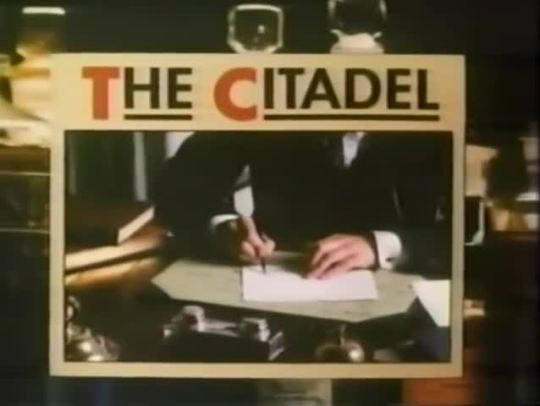
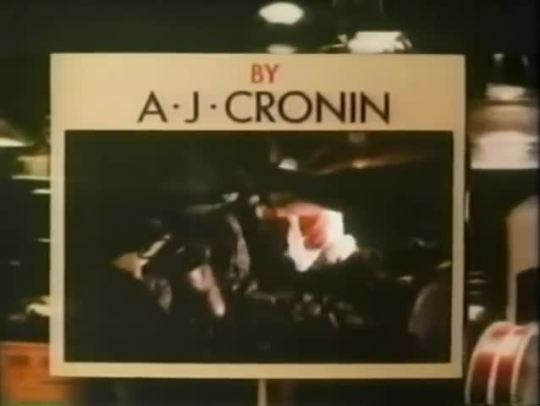
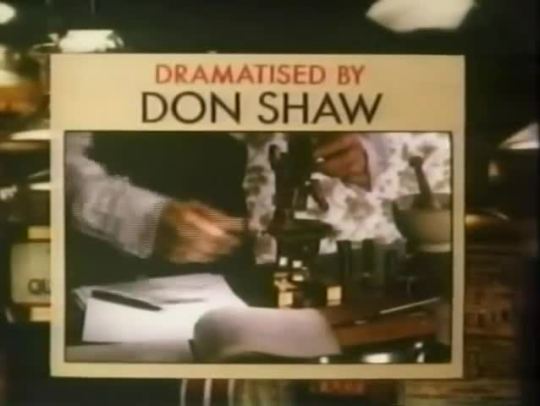
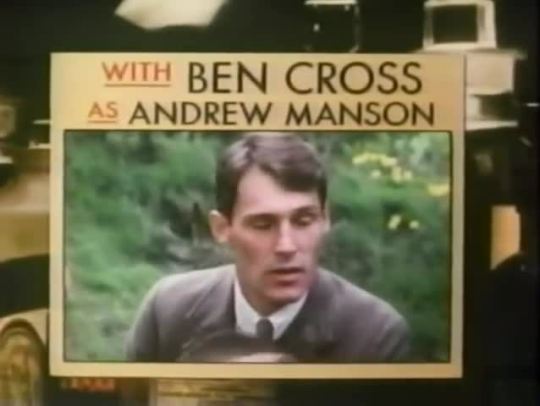
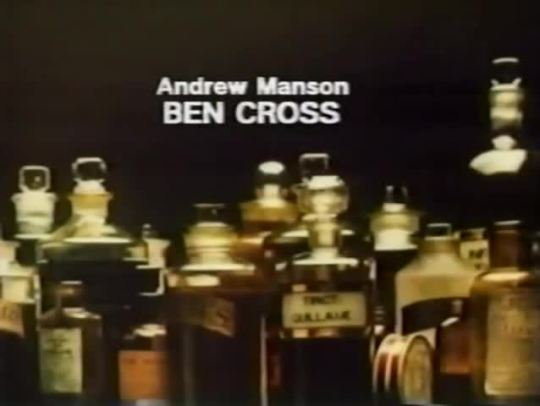


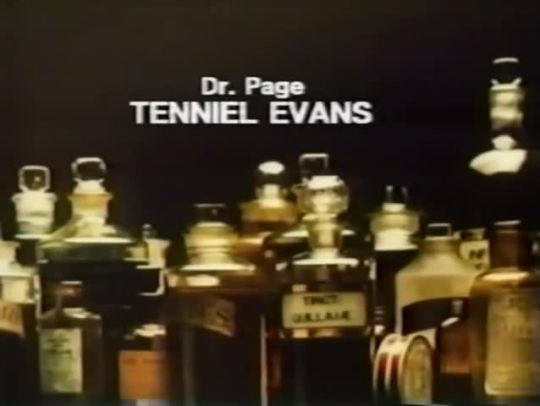

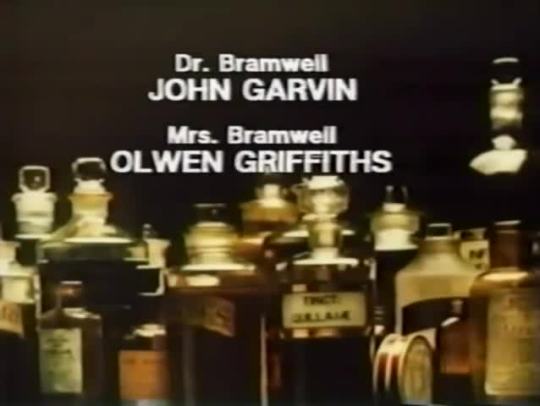

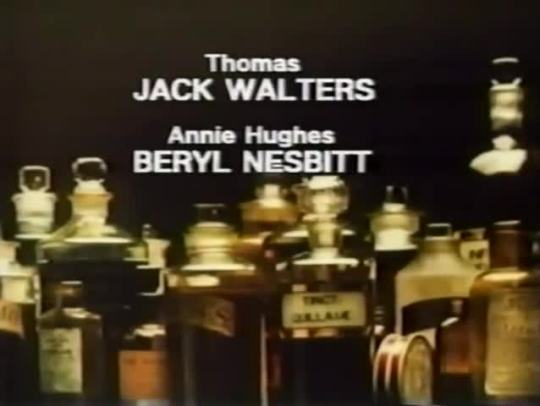
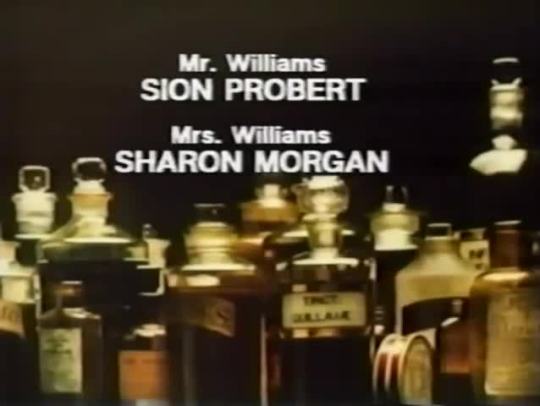
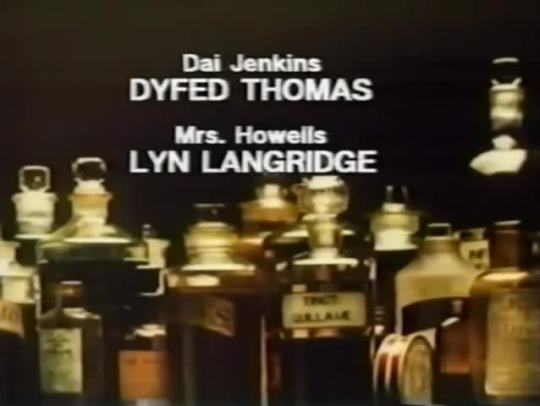
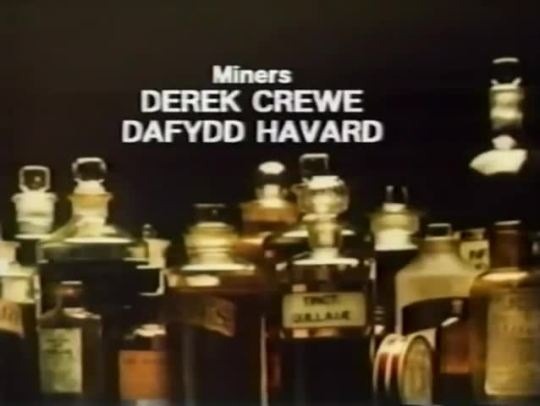
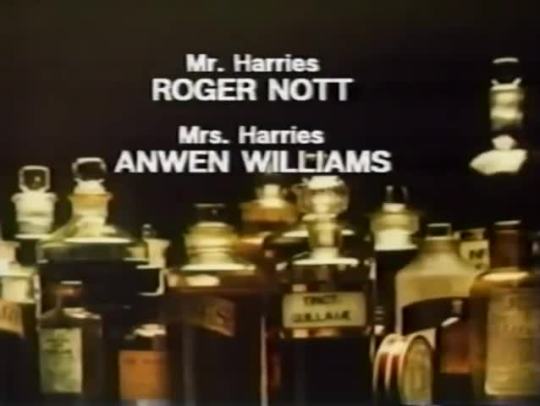



The Citadel - BBC One - January 20, 1983 - March 24, 1983 / PBS - November, 1983 - January 1984 (Masterpiece Theatre)
Drama (10 Episodes)
Running Time: 60 minutes
Stars:
Ben Cross as Dr. Andrew Manson
David Gwillim as David Hope
Clare Higgins as Christine Barlow / Manson
Tenniel Evans as Dr. Page
Gareth Thomas as Dr. Philip Denny
Michael Cochrane as Freddie Hamson
Cynthia Grenville as Blodwen Page
Colin Baker as Richard Vaughan
Jane How as Mrs. Vaughan
Tim Wylton as Ben Chenkin
Don Fellows as Richard Stillman
Beryl Nesbitt as Annie Hughes
John Nettleton as Charles Ivory
Raymond Bowers as Dr. Llewellyn
Dilys Price as Mrs. Llewellyn
David Pugh as Joe Morgan
Dyfed Thomas as Dai Jenkins
Jack Walters as Old Thomas
Richard Davies as Dr. Watkins
Janet Davies as Mrs. Watkins
Carmen du Sautoy as Frances Lawrence
Avril Elgar as Nurse Sharp
Oliver Ford Davies as Reverend Parry
Michael Gough as Sir Jenner Halliday
Charles Kay as Mr. Hopper
Buster Merryfield as Professor Challis
John Welsh as Sir Robert Abbey
#The Citadel#TV#BBC One#Drama#1983#1980's#Ben Cross#David Gwillim#Clare Higgins#Tenniel Evans#Gareth Thomas#Michael Cochrane
3 notes
·
View notes
Text
Dilys Price without her 👓
S13 E24: "Calender Challenge" where people tried to take excellent 📸 for them to be on a new calender

8 notes
·
View notes
Text
youtube
elvis cool ices
1 note
·
View note
Text
39th Painting of Dear, United Kingdom
I made the thirty-eighth painting of Dear, United Kingdom. This is Derek Price, Norman's brown-haired cousin who came to live with him and his aunt Dilys after his parents sent him in the 6th season.

Derek Price from Fireman Sam - 26th September 2023
In the cartoon, Derek has brown hair and eyes, fair skin and light freckles. Unlike Norman, he doesn't wear a pair of glasses and also speaks a British accent.
In the fanfics, Derek's eyes are now bright olive green and has pale skin colour. He also wore a light purplish-grey woven sweater and a pair of grey pants and maroon shoes.
I made him a two shades of purplish-burgundy coloured background which is dark at the top and light at the bottom.
Beginning | Previous | Next
#fireman sam#derek price#hair colour#hairstyles#facial expressions#costumes#clothes#outfits#fanfics#poster paintings#paintings#drawings#british films and tv shows#cartoons#films and tv shows
2 notes
·
View notes
Photo
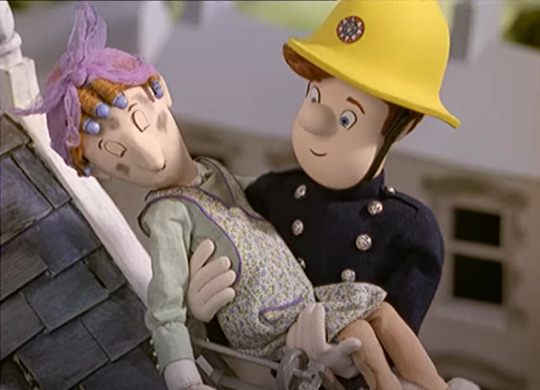
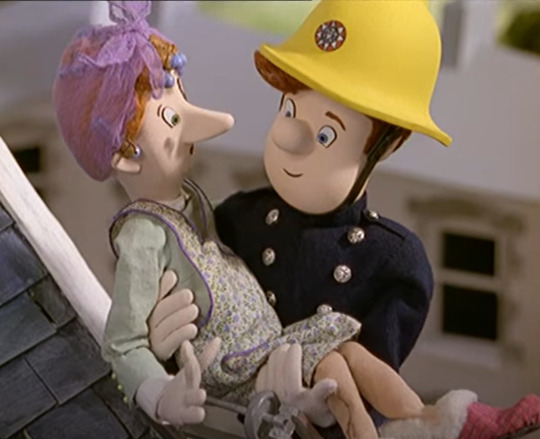


This was such a cute and funny scene
I love how his facial expression slowly changes like “Dilys not now, I’m on duty”
15 notes
·
View notes
Text
Was wondering whether Norman Price would've worn a mask for any of the pandemic and concluded that Dilys wouldn't allow it cause she's heard they're putting microchips in the masks
12 notes
·
View notes
Link
Check out this listing I just added to my Poshmark closet: 3X's HP - Shellys London Dilys Platform.
0 notes
